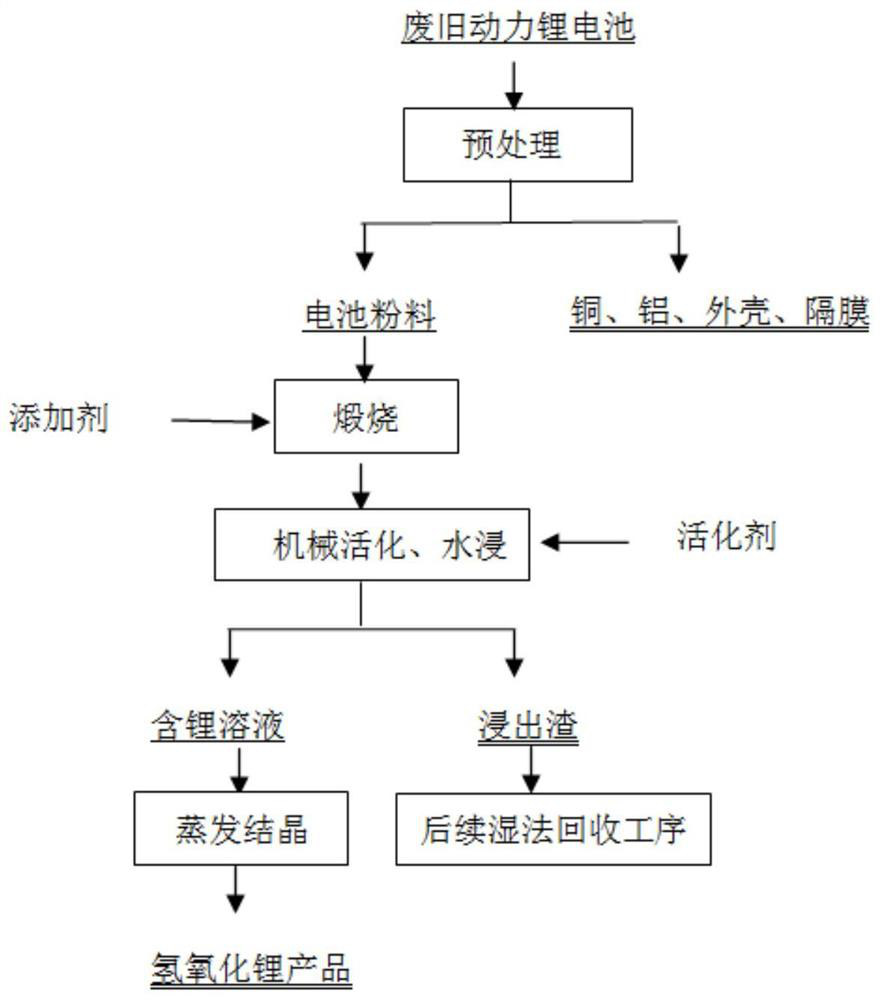Method for recycling lithium in waste power lithium battery
A technology for used batteries and lithium batteries, applied in lithium batteries, battery recycling, recycling technology and other directions, can solve the problems of difficult to achieve industrial application, long treatment process, affecting lithium yield, etc., to achieve efficient recovery and reuse, improve The leaching rate, the effect of a wide range of trials
- Summary
- Abstract
- Description
- Claims
- Application Information
AI Technical Summary
Problems solved by technology
Method used
Image
Examples
Embodiment 1
[0028] (1) Pretreatment steps of waste power lithium batteries (nickel-cobalt-manganese ternary lithium batteries, nickel-cobalt-aluminum lithium batteries, and cobalt-oxide lithium batteries) pretreatment steps: put 20kg of waste power lithium batteries in an inert gas (nitrogen) protection , Dismantling in a closed state, primary shredding, secondary crushing, multi-stage sorting, and screening to obtain waste battery powder, the particle size of the battery powder is 8 μm.
[0029] (2) The step of high-temperature calcination of battery powder: add 50 g of carbon powder to 50 g of waste power battery powder obtained by sorting, mix and put it into a box-type resistance furnace for high-temperature calcination. The calcination temperature is 260°C, and the holding time is 120 minutes. After calcination, the temperature is naturally lowered, and it is ready for use.
[0030] (3) The steps of mechanical activation and water immersion of battery powder: add 100g of zirconia act...
Embodiment 2
[0033] (1) Pretreatment steps of waste power lithium battery (nickel-cobalt-manganese ternary lithium battery): 50kg of waste power lithium battery is disassembled under the protection of inert gas (argon) and sealed, first-level shredding, second-level Crushing, multi-stage sorting, and sieving to obtain waste battery powder, the particle size of the battery powder is 18 μm.
[0034] (2) The step of high-temperature calcination of battery powder: add 150 g of graphite to 100 g of waste power lithium-ion battery powder obtained by sorting, mix and put it into a box-type resistance furnace for high-temperature calcination. The calcination temperature is 420°C, the holding time is 60min, the temperature is naturally lowered after calcination, and it is ready for use.
[0035] (3) The steps of mechanical activation and water immersion of battery powder: add 100g of zirconia activator to 100g of battery powder after calcining, the particle size of zirconia activator is 20mm, add 1...
Embodiment 3
[0038] (1) Pretreatment steps of waste power lithium batteries (several hybrid batteries of nickel-cobalt-manganese ternary lithium batteries, lithium manganese oxide batteries, and lithium iron phosphate batteries): Put 100kg of waste power lithium batteries in an inert gas carbon dioxide protection and sealed state dismantling, primary shredding, secondary crushing, multi-stage sorting, and screening to obtain waste battery powder with a particle size of 28 μm.
[0039] (2) The step of high-temperature calcination of battery powder: add 150 g of carbon powder to the 75 g of waste power lithium-ion battery powder obtained by sorting, mix and put it into a box-type resistance furnace for high-temperature calcination. The calcination temperature is 580°C, the holding time: 30min, and the temperature is naturally lowered after calcination, and it is ready for use.
[0040](3) The steps of mechanical activation and water immersion of battery powder: add 75g of zirconia activator ...
PUM
| Property | Measurement | Unit |
|---|---|---|
| particle diameter | aaaaa | aaaaa |
| particle diameter | aaaaa | aaaaa |
| particle diameter | aaaaa | aaaaa |
Abstract
Description
Claims
Application Information
 Login to View More
Login to View More - R&D
- Intellectual Property
- Life Sciences
- Materials
- Tech Scout
- Unparalleled Data Quality
- Higher Quality Content
- 60% Fewer Hallucinations
Browse by: Latest US Patents, China's latest patents, Technical Efficacy Thesaurus, Application Domain, Technology Topic, Popular Technical Reports.
© 2025 PatSnap. All rights reserved.Legal|Privacy policy|Modern Slavery Act Transparency Statement|Sitemap|About US| Contact US: help@patsnap.com

